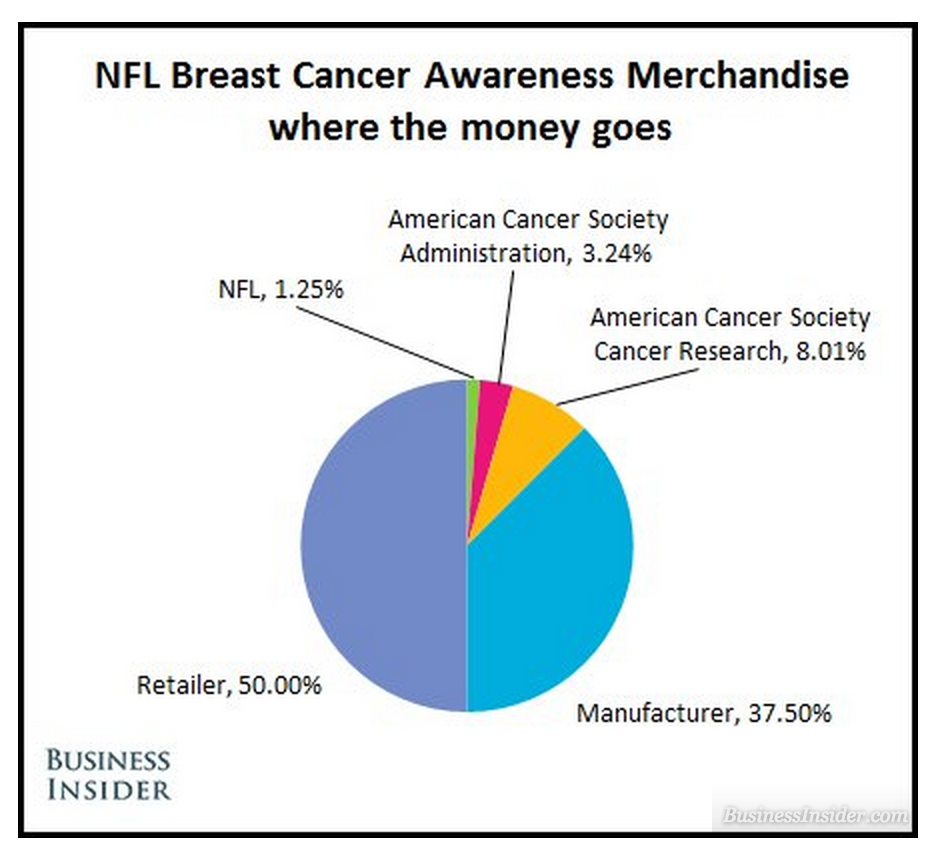Where Does NFL Breast Cancer Money Really Go?

By:
2015 marks seventh year that the National Football League (NFL), the NFL Players Association, and the American Cancer Society (ACS) are teamed up to support Breast Cancer Awareness Month through “A Crucial Catch: Annual Screen Saves Lives.” The campaign is meant to remind women how important it is to be screened for breast cancer, potentially saving lives. Millions of dollars have been raised through the campaign, with the majority of money stemming from the sale of "Crucial Catch" merchandise and the NFL auction website.
However, the NFL has been criticized by more than a few people for "Crucial Catch" for several reasons. Some want to know exactly where the money is going, others have criticized the NFL for creating what they see as a PR campaign meant to sell tickets and appeal to female fans. So what's the real deal? It's complicated.
RELATED: Here's Exactly How the NFL Avoids Taxes
According to Business Insider, the campaign is multifaceted. Players wear pink cleats, which is the awareness portion of the campaign. There are off-field autographed or noteworthy products sold; the league reports that 100 percent of profits go to the ACS. Finally, there is officially licensed NFL Breast Cancer gear, of which a portion of the proceeds go to finding a cure.
The officially licensed gear is where much of the controversy lies. In 2013, ESPN’s Darren Rovell, a sports business analyst, reported that the NFL says it takes a 25 percent royalty from the wholesale price of pink products, which is half the price of retail, and then donates 90 percent of that royalty to ACS.
Business Insider crunched those numbers after Rovell tweeted, making it more simple to understand.
For every $100 in pink merchandise sold, $11.25 goes to ACS, and the NFL keeps the rest. The money is then divided up by the company that makes the merchandise and sells it. (This “company” is often the NFL or individual teams.)
Then, of the $11.25 given to ACS, only 71.2 percent of that number actually goes to cancer research.
At the end of the day, this means that only eight percent of total money spent on pink NFL merchandise actually goes toward cancer research.
 Business Insider
Business Insider
RELATED: American Parents are a Huge Threat to the NFL
Other criticism of the "Crucial Catch" campaign.
Criticisms of the "Crucial Catch" campaign don't end there. While October is Breast Cancer Awareness month, it's also Domestic Violence Awareness month. The league has been widely criticized for its lack of response to domestic violence against women. To remedy this, they launched this Super Bowl< > ad about domestic violence in January of this year. The PSA encourages viewers to "say no more" to domestic violence, and donate money to the organization of the same name. Critics say "A+" for effort, but actions speak louder than words.
< >ATTN:'s Mike Vainisi wrote about the NFL's recent domestic violence scandals—scandals you may not have heard about while the media focused on "deflategate."
One of those scandals is over the drafting of Frank Clark. When the Seattle Seahawks drafted former Michigan defensive end Frank Clark, who was kicked off his college team after a domestic violence arrest in November of 2014. The NFL didn't just defend him, the Seahawks General Manager John Schneider asserted that an investigation into the incident concluded that Clark never hit his girlfriend at all.
"Our organization has an in-depth understanding of Frank Clark’s situation and background,” Schneider said to reporters in a conference call in May of this year. "We have done a ton of research on this young man. There hasn’t been one player in this draft that we have spent more time researching and scrutinizing more than Frank. That’s why we have provided Frank with this opportunity and are looking forward to him succeeding in our culture here in Seattle.”
RELATED: The NFL Just Released Its First Anti-Domestic Violence Ad Ahead of the Super Bowl
However, the Seattle Times reports that the Seahawks didn't ever interview the two women who were witnesses to the act of violence, both of whom made statements to police the night that it happened. What's more, Clark actually took a plea deal three weeks before Schneider made those comments to reporters, pleading guilty to persistent disorderly conduct. Clark was given a $250 with no further jail time. He will not have any domestic violence conviction on his record.
